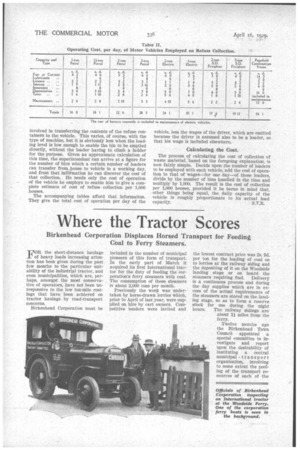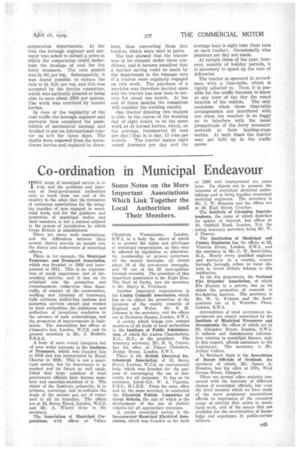Where the Tractor Scores
Page 130

Page 131

If you've noticed an error in this article please click here to report it so we can fix it.
Birkenhead Corporation Displaces Horsed Transport for Feeding Coal to Ferry Steamers.
MIOR the short-distance haulage of heavy loads increasing attention has been given during the past few months to the particular suitability of the industrial tractor, and even municipalities, which are, perhaps, amongst the most conservative of operators, have not been unresponsive to the low ton-mile costings that have been achieved on tractor haulage by road-transport concerns.
Birkenhead Corporation must be included in the number of municipal pioneers of this form of transport. In the early part of March it acquired its first International tractor for the duty of feeding the corporation's ferry steamers with coal. The consumption of these steamers Is about 2,000 tons per month.
Previously the work was undertaken by horse-drawn lorries which, prior to April of last year, were supplied on hire by cart owners. Competitive tenders were invited and the lowest contract price was 2s. 9d. per ton for the loading of coal on to lorries at the railway siding and the depositing of it on the Woodside landing stage or on board the steamers requiring fuel. Delivery is a continuous process and during the day supplies which are in excess of the actual requirements of the steamers are stored on the landing stage, so as to form a reserve stock for use during the night hours. The railway sidings are about 1} miles from the ferry.
Twelve months ago the Birkenhead Town Council appointed a special committee to investigate and report upon the desirability of instituting a central municipal transport organization, involving to some extent the pooling of the transport resources of each of the
corporation departments. At the time the borough engineer and surveyor was asked to submit a price at which the corporation could undertake the haulage of coal for the ferry steamers. Tim rate quoted was 2s. 8th per ton. Subsequently, it was found possible to reduce the rate to 2s. Rd. per ton, and this was accepted by the ferries committee, which was naturally pleased at being able to save about in) per annum. The work was executed by horsed lorries.
In view of the regularity of the coal traffic the borough engineer and surveyor then examined the possibilities of mechanical haulage and decided to put an International tractor on tect for three days. The shafts were removed from the horsedrawn lorries and replaced by draw
bars, thus converting them into trailers, which were used in pairs.
The test showed that the tractor was in its element under these conditions, and it became manifest that a further saving could be made by the department in the tonnage rate if a tractor were regularly engaged on this work. The purchase of a machine was therefore decided upon and the tractor has now been in service for about one month. At the end of three months the committee will consider the working results.
One tractor drawing two trailers is able, in the course of the working day of eight hours, to do the same work as 4ihorsed lorries, which, on the average, transported 65 tons per day f' that is to say, 15 tons per vehicle. The tractor makes eight round journeys per day and the average load is eight tons (four tons on each trailer). Occasionally nine journeys per day are made.
At certain times of the year, however, notably at holiday periods, it is necessary to speed up the rate of deliveries.
The tractor is operated in accordance with a time-table, which is rigidly adhered to. Thus, it is possible for the traffic foreman to know at any hour of the day the exact location of the vehicle. The only occasions when these time-table arrangements are interfered with are when the weather is so foggy as to interfere with the usual promptitude of the ferry steamers' arrivals at their landing-stage berths. At such times the tractor may get held up in the traffic queue.








































































































































































































